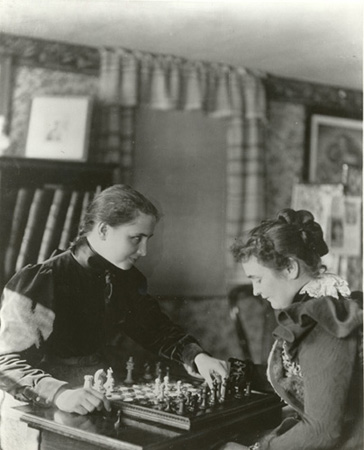"What do I consider a teacher should be? One who breathes life into knowledge so that it takes new form in progress and civilization."
- Helen Keller in a speech to the National Education Association, 1938

Few people in the United States have written more eloquently about the transformative power of education than Helen Keller. In honor of Teacher Appreciation Week, we looked back at Helen's reflections on the importance of education, and how her own beloved teacher, Annie Sullivan, changed her life.
When Helen lost her sight and hearing due to a childhood illness, few could have predicted not only that she would become the first deafblind person to graduate from college, but that she would also go on to become an acclaimed author and public figure, playing a leading role in many of the significant political, social, and cultural movements of the 20th century.
Helen began writing The Story of My Life in 1902, when she was just 22 years old and still a student at Radcliffe College, the sister school of Harvard University in Cambridge, Massachusetts. Thinking back on her earlier education, Helen wrote about the day that young Anne Sullivan first arrived to tutor her.
The most important day I remember in all my life is the one on which my teacher, Anne Mansfield Sullivan, came to me. I am filled with wonder when I consider the immeasurable contrasts between the two lives which it connects. It was the third of March, 1887, three months before I was seven years old.
Annie's approach to teaching Helen was creative and flexible. Annie wrote, "I have decided not to try to have regular lessons for the present," and frequently took her student outside to experience and learn about the natural world. Helen loved these excursions. Here is her memory of the famous moment at the water pump, where she first understood that everything has a name:
She [Annie] brought me my hat, and I knew I was going out into the warm sunshine. This thought, if a wordless sensation may be called a thought, made me hop and skip with pleasure.
We walked down the path to the well-house, attracted by the fragrance of the honeysuckle with which it was covered. Some one was drawing water and my teacher placed my hand under the spout. As the cool stream gushed over one hand she spelled into the other the word water, first slowly, then rapidly. I stood still, my whole attention fixed upon the motions of her fingers. Suddenly I felt a misty consciousness as of something forgotten--a thrill of returning thought; and somehow the mystery of language was revealed to me. I knew then that "w-a-t-e-r" meant the wonderful cool something that was flowing over my hand. That living word awakened my soul, gave it light, hope, joy, set it free! There were barriers still, it is true, but barriers that could in time be swept away.
I left the well-house eager to learn. Everything had a name, and each name gave birth to a new thought.
Helen quickly proceeded to master signing the manual alphabet, and became an avid braille reader and talented writer. As an adult, her passport listed her profession as "author."
When Helen Keller accepted an honorary degree from Temple University many years later, in 1931, she paid tribute to the role her beloved teacher played in her education.
Together we went through Radcliffe College. Day after day during four years she sat beside me in the lecture halls and spelled into my hand word by word what the professors said; and nearly all the books she read to me in the same way.
Yet when I received my degree from Radcliffe, not a word of recognition was given her! The pain caused me by that indifference or thoughtlessness is still a thorn in my memory. So nothing in our experience has made me happier than your splendid tribute to her and your earnest desire to honor her also with a degree. That she should refuse to stand with me this day is a grief to me, but her refusal is consistent with her attitude throughout the years we have been together. She has closed every door to any recognition that would emphasize her individuality. I can only bow my head and repeat my thanks to you for your beautiful thought of us both.